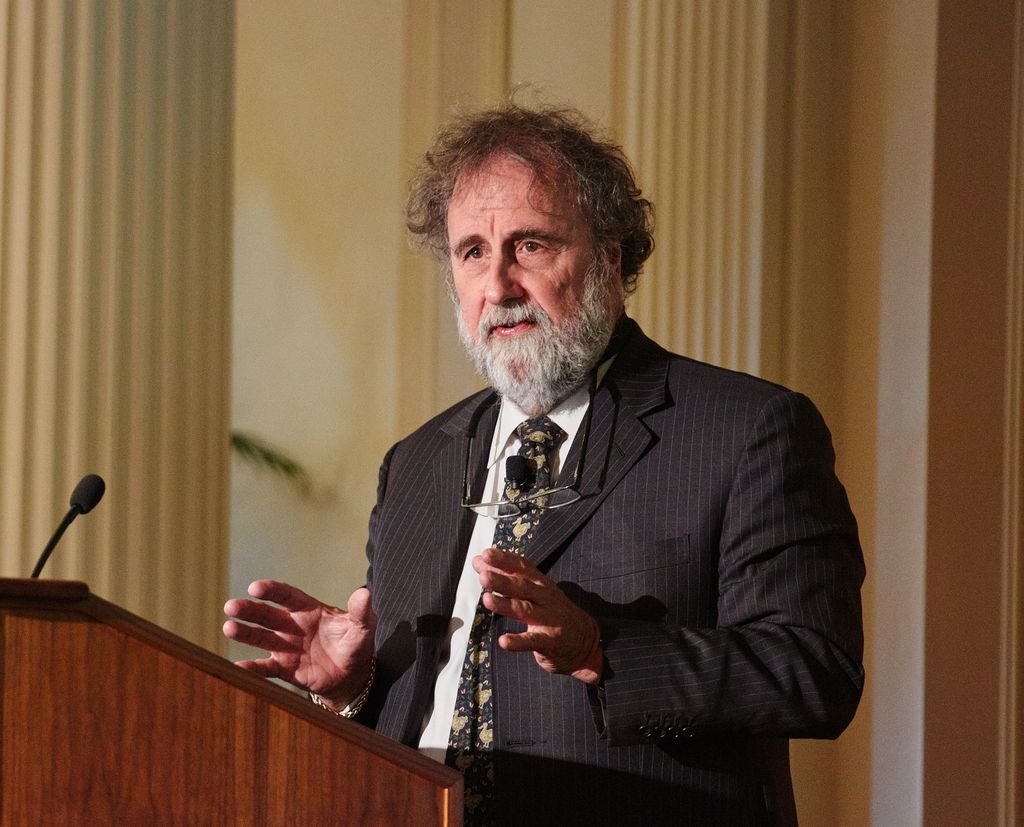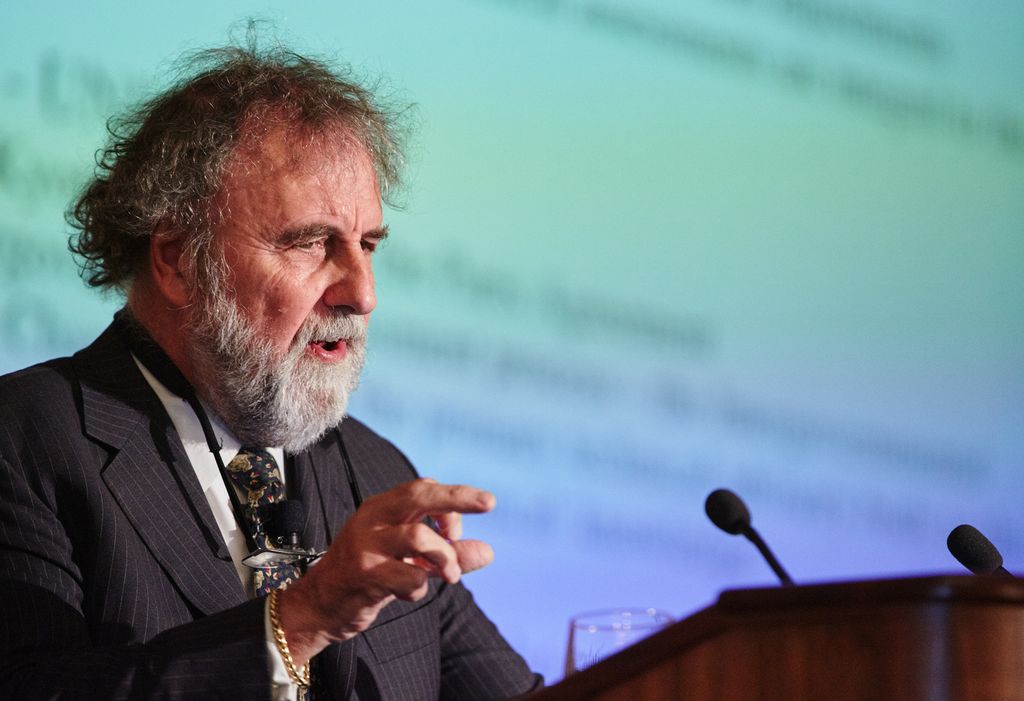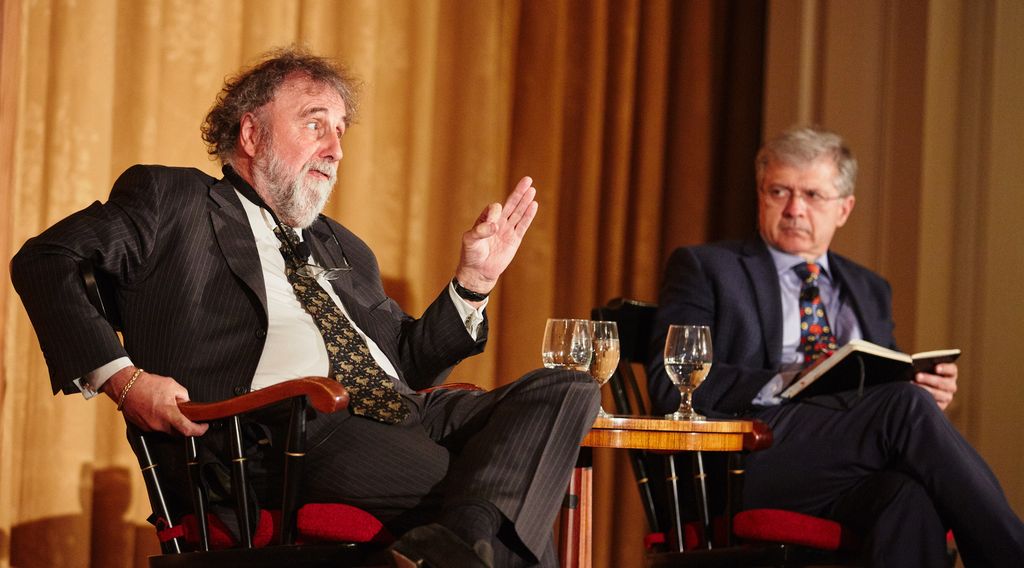Sir Robert Watson Delivers 2016 Pardee Center Distinguished Lecture
Sir Robert Tony Watson, the world’s leading authority on integrated scientific assessments, discussed his experiences over the past 30 years and his views on the future of such assessments when he delivered the 2016 Pardee Center Distinguished Lecture at the Metcalf Trustee Center on April 11. The event was sponsored by the Frederick S. Pardee Center for the Study of the Longer-Range Future.
 Speaking before a crowd of approximately 60 people (in addition to those watching the live webcast), Prof. Watson called it “absolutely critical” for interdisciplinary groups of scientists to work with government policymakers and other stakeholders to identify the most relevant scientific evidence on questions important to formulating policy, and then look at “plausible futures” based on the various decisions that could be made.
Speaking before a crowd of approximately 60 people (in addition to those watching the live webcast), Prof. Watson called it “absolutely critical” for interdisciplinary groups of scientists to work with government policymakers and other stakeholders to identify the most relevant scientific evidence on questions important to formulating policy, and then look at “plausible futures” based on the various decisions that could be made.
He stressed that participants in such assessments should include a wide range of disciplines, including the social sciences and humanities, as well as a geographic balance with a special effort to include scientists and policymakers from developing countries.
An atmospheric scientist, Prof. Watson played a central role in the first international integrated scientific assessment in the 1980s, which was created to synthesize the scientific knowledge concerning a hole in the stratospheric ozone layer above Antarctica. The assessment found the gap was related to widespread use of chlorinated and brominated chemical compounds in refrigerants and other commonly used consumer products, such as aerosol hairsprays and deodorants. That assessment led to the well-known Montreal Protocol, an international agreement that phased out and ultimately banned the use of stratospheric ozone-depleting chemicals worldwide and became a model for future global environmental agreements and treaties.
Although the initial agreement in 1987 was based largely on theoretical models of how the chemical compounds affected the ozone layer, a series of amendments and adjustments in the 1990s were based on direct observations and increased understanding of the interactions between such chemicals and stratospheric ozone. Continued monitoring and modeling indicates there will be full recovery of the gap in the ozone layer by 2030, Prof. Watson noted.
 “That is really THE success story,” he said. “I doubt we will see anything so structured again on a major international policy issue.”
“That is really THE success story,” he said. “I doubt we will see anything so structured again on a major international policy issue.”
Prof. Watson subsequently served as chair of the Intergovernmental Panel on Climate Change (1997-2002), co-chair of the International Millennium Ecosystem Assessment (2000-2005), and co-chair of the UK National Ecosystem Assessment (2010-2011), and has been involved at various levels in several others.
He said the five IPCC assessment reports over the past 25 years have provided strong information to governments on climate change and the likely adverse impacts around the world. Although he said he was heartened to see 196 governments sign on to make intended nationally determined contributions (INDCs) to reduce carbon emissions that contribute to climate change, it won’t be enough to meet the desired goal to keep the average global temperature from increasing by only 2 degrees Celsius above the pre-industrial global average. He said expanded and improved renewable energy technology, and technology that can capture and store carbon emissions from fossil fuels – which has not yet been proven to be commercially viable —will be necessary to achieve that goal.
He identified several components of integrated assessments that are critical to successful outcomes, including: an open and transparent process for deciding on the questions to be addressed; participants from various disciplines and stakeholders, including the private sector and non-governmental organizations; peer review by all relevant stakeholders involved; an agreed-upon process for dealing with controversial issues and questions; and a summary for decision-makers that is “reader-friendly”. He also called for more support from developed countries to provide for increased participation from developing country scientists and stakeholders.
Prof. Watson is currently vice-chair of the Intergovernmental Platform for Biodiversity and Ecosystem Services (IPBES) assessment, and his vast experience is influencing that project.
He said efforts will be made to identify both the market and non-market values of biodiversity by looking at the findings in relation to each of the 17 sustainable development goals announced by the United Nations late last year. In taking this step “we’re saying the economy is only one part of the value system,” he said.
Prof. Watson also said this new assessment will incorporate some web-based features that will make it easier to access and understand the outcomes, in keeping with how people get and use information in the 21st century.
